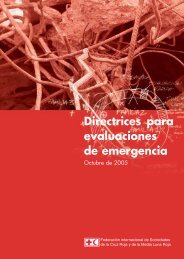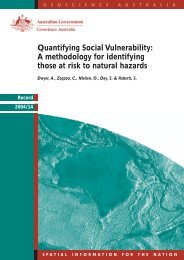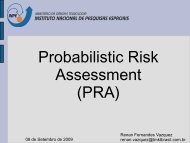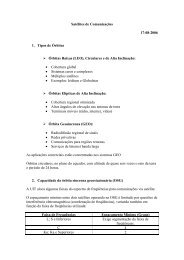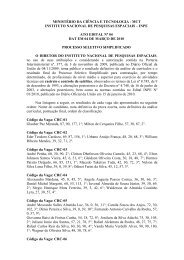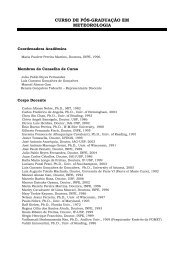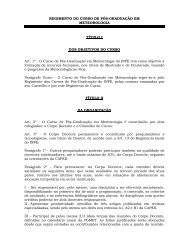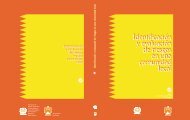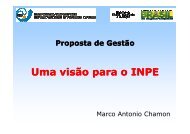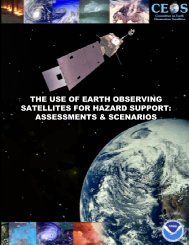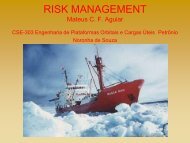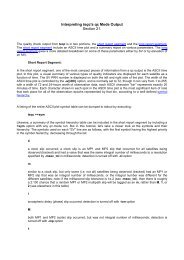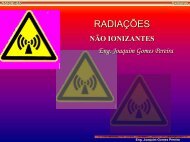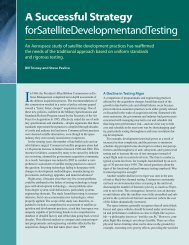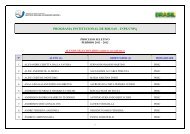Living with Risk. A global review of disaster reduction initiatives
Living with Risk. A global review of disaster reduction initiatives
Living with Risk. A global review of disaster reduction initiatives
Create successful ePaper yourself
Turn your PDF publications into a flip-book with our unique Google optimized e-Paper software.
5<br />
<strong>Living</strong> <strong>with</strong> <strong>Risk</strong>: A <strong>global</strong> <strong>review</strong> <strong>of</strong> <strong>disaster</strong> <strong>reduction</strong> <strong>initiatives</strong><br />
<br />
<br />
<br />
<br />
<br />
<br />
<br />
<br />
communication networks/forums for dialogue;<br />
institutional partnerships vis a vis memorandums<br />
<strong>of</strong> agreements between agencies<br />
and organizations;<br />
formalized joint mandates, legislation,<br />
policies and plans <strong>with</strong>in public authorities;<br />
multi-sector issue advisory groups;<br />
multi-disciplinary research projects;<br />
integrated databases;<br />
search conferences; and<br />
other participatory planning processes.<br />
Technical and research networks<br />
Disaster <strong>reduction</strong> and management require<br />
comprehensive knowledge about hazardous<br />
events, the likelihood <strong>of</strong> the occurrence and the<br />
possible impacts they can have on societies, as<br />
well as the social, economic and environmental<br />
implications related to vulnerability. Germany<br />
has substantial scientific and technical capabilities<br />
in these areas. Two complementary<br />
research networks have developed <strong>with</strong> the aim<br />
<strong>of</strong> using this experience to advance multi-disciplinary<br />
approaches to <strong>disaster</strong> research.<br />
In 1999, the German Committee for Natural<br />
Disaster Reduction urged the creation <strong>of</strong> a<br />
Centre for Natural <strong>Risk</strong>s and Development<br />
(ZENEB) (Zentrum für Naturrisiken und<br />
Entwicklung) to focus attention on sociological<br />
research about <strong>disaster</strong>s in developing<br />
countries. Organized as a network based in<br />
the Universities <strong>of</strong> Bonn and Bayreuth, ZENEB<br />
involves people in Germany and from other<br />
countries who share an interest in the relationships<br />
between national development<br />
issues and natural hazard risks in developing<br />
countries. Within this pr<strong>of</strong>essional network,<br />
general approaches to risk research in the<br />
context <strong>of</strong> sustainable development are examined<br />
in depth, and individual investigations<br />
and case studies are conducted in developing<br />
countries. An interesting feature is the development<br />
<strong>of</strong> indicators to describe the relative<br />
risks <strong>of</strong> different countries, where ZENEB<br />
has been collaborating <strong>with</strong> UNDP. Another<br />
undertaking is the set up a database <strong>of</strong> those<br />
indicators that may be used to frame socio-<br />
economic early warning systems (see<br />
www.zeneb.de).<br />
Focusing more on natural hazard knowledge in<br />
the <strong>disaster</strong> equation, the German research<br />
institutions have formed the German Research<br />
Network for Natural Disasters (DFNK)<br />
(Deutsches Forschungsnetz Naturkatastrophen).<br />
The goal <strong>of</strong> the network is to provide the scientific<br />
fundamentals <strong>of</strong> advanced risk management<br />
associated <strong>with</strong> natural hazards and to<br />
make that knowledge more widely available for<br />
users. Realistic scenarios are developed to estimate<br />
current levels <strong>of</strong> risk and the dynamic<br />
features <strong>of</strong> future risk due to <strong>global</strong> change in<br />
such areas as climate variability, increasing<br />
density <strong>of</strong> population and changing land use<br />
values in endangered areas. This information<br />
can be used for early warning purposes, in support<br />
<strong>of</strong> decision-support systems in <strong>disaster</strong><br />
management, and for developing greater<br />
understanding <strong>of</strong> the issues among both political<br />
authorities and the public.<br />
The 14 partner institutions shown in the figure<br />
below and the projects <strong>of</strong> the network are<br />
grouped into five clusters: storm risk assessment,<br />
flood risk assessment, earthquake risk<br />
assessment, forest fire simulation system, and<br />
databases and information systems. The joint<br />
user-oriented research requires close collaboration<br />
among the different clusters, which is<br />
aided by the information cluster. This provides<br />
data, synthesizes information and applies tools<br />
for higher-level information systems such as<br />
clearing house functions, data warehousing<br />
and near-real time transmission.<br />
The city <strong>of</strong> Cologne was chosen as the initial<br />
area <strong>of</strong> interest for the combined assessment <strong>of</strong><br />
floods, earthquakes and storms. The respective<br />
clusters apply extensive data sets, analytical<br />
techniques and simulation models to risk estimation<br />
processes so that current risks can be<br />
depicted, future risks detected, and safety recommendations<br />
made. A second regional<br />
emphasis has been placed on the Brandenburg<br />
region <strong>with</strong> Berlin as an adjacent focal point.<br />
There, the forest fire simulation cluster is monitoring<br />
the hazard, using simulations, and<br />
developing an early warning system.<br />
246



